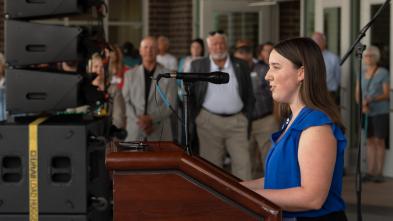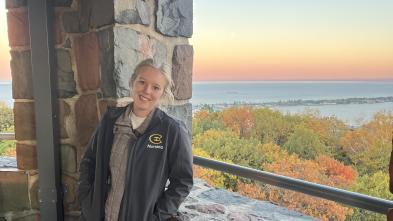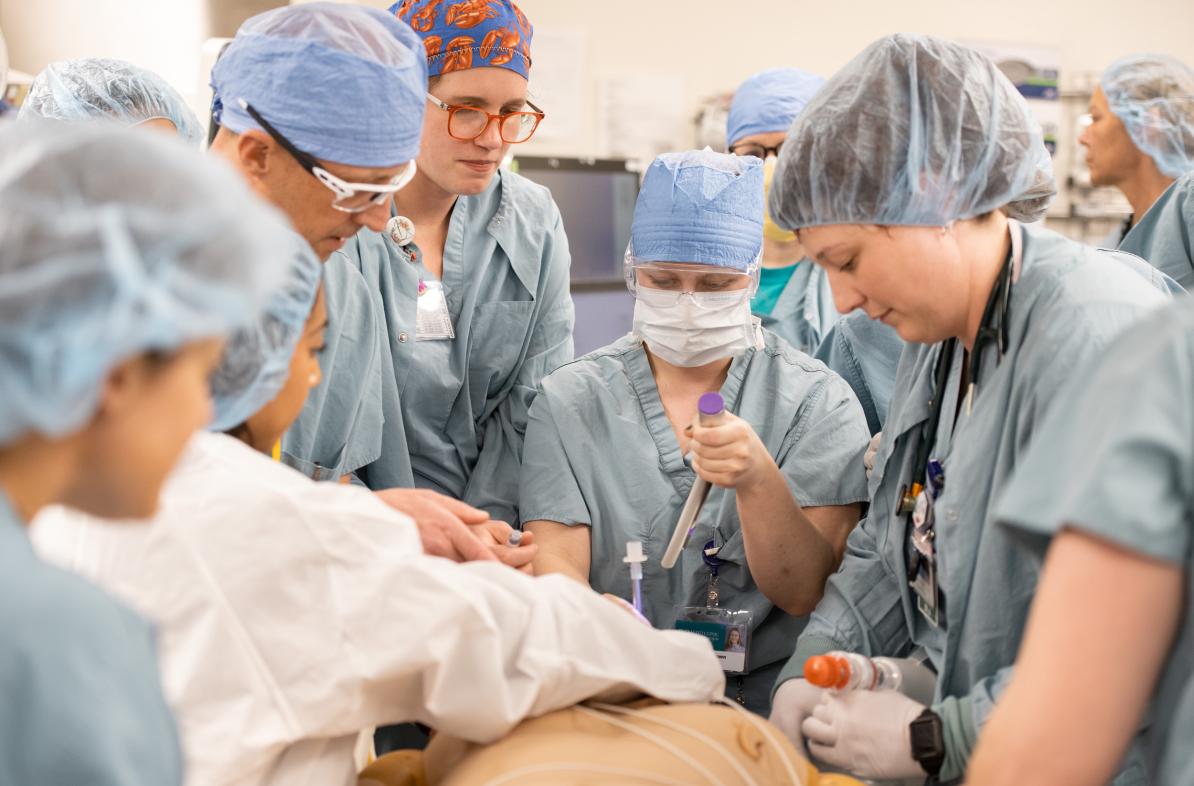
Catching up with three Blugold Biomedical Innovator Scholars
As this spring 2023 semester ends, we thought it would be a great time to offer a few updates on the Blugold Biomedical Innovator Scholars program.
One of our most exciting scholarships, the Biomedical Innovator Scholars program annually pairs 10 incoming first-year students who plan to pursue a career path in health care or biomedical science with a UW-Eau Claire faculty mentor on a research project in collaboration with a Mayo Clinic Health System physician or clinical researcher.
An unparalleled academic and pre-professional experience, this unique program immerses students from day one in the groundbreaking undergraduate research the University of Wisconsin-Eau Claire has become known for. It also offers a “four-year peek” into the health care and health science professions, not just as an onlooker but as a colleague on research projects with the potential to directly impact patient care and outcomes.
We’ve asked one innovator scholar from each of the first three cohorts to give us an update on their projects, their experiences so far and the ways in which they see this program shaping their goals and options for the future.
First-year scholar: Easton Blissenbach
Biology/microbiology major from Goodhue, Minnesota
Research mentor: Dr. Jamie Lyman-Gingerich, associate professor of biology
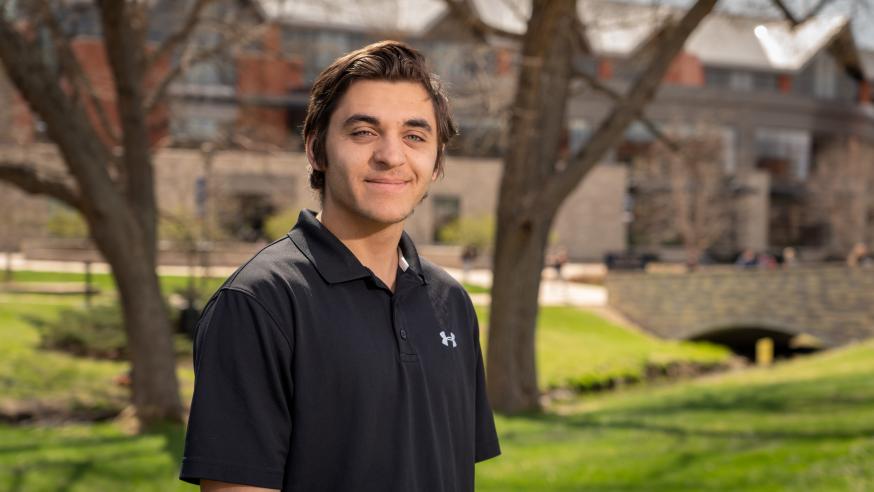
"UW-Eau Claire’s research agreement with Mayo Clinic Health System was one of the main reasons I applied to the university. The Mayo Clinic is one of the best hospitals in the world, so knowing that it is heavily involved in our undergraduate research is exciting. Doing research at UWEC in this collaboration is a fantastic opportunity to have in preparation for graduate school for biomedical research," Blissenbach says.
"The Biomedical Innovator Scholarship piqued my interest because it guarantees the ability to start this level of research in my first year on campus. To graduate with four full years of biomedical research experience will be the best way for me to narrow down graduate school and career paths.
The project I am part of examines biological variants of unknown significance to determine if they contribute to a certain degenerative eye disease and Dr. Jamie Lyman-Gingerich is my mentor. She has not only helped me learn how to research but also to adjust to college life. Her flexibility in working with our schedules has let me balance the time needed for classes, research and my other activities.
I am hoping to have a career in immunology, namely vaccine development. I have always been interested in viruses and disease, so the idea of being able to help find cures for them excites me. However, since I have a lot of education ahead of me, there is a chance that this could change and I might find something else that interests me. For now, though, I am preparing myself to be able to pursue a career in vaccine development."
A word from Blissenbach’s mentor, Dr. Jamie Lyman-Gingerich, associate professor of biology:
“This academic year Easton has been the only Biomedical Innovator Scholar in my lab, and he’s been able to learn from a team of dedicated and talented fellow research students. He brings an enthusiasm for research and, combined with his strong academic skills, Easton has been eager to dive into the challenges of research from the beginning," says Lyman-Gingerich.
“The support for undergraduate research on this campus allows student researchers like Easton to go beyond what they are learning in the classroom, to make connections with scientists on campus and beyond, and to develop skills that will serve them well whether they choose a career specifically or research or pursue other avenues as professionals.”
Second-year scholar: Paige Drazkowski
Sophomore nursing major from Fountain City
Research Mentor: Dr. David Jewett, professor of psychology
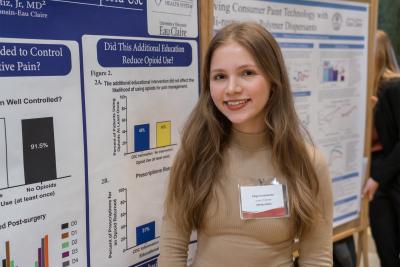
"This is my second year in the program doing research with Dr. Jewett in his neuroscience lab. Last year we were studying the effects of food deprivation on rat subjects in relation to an antipsychotic drug called clozapine," says Drazkowski.
"This year, I was able to completely focus on our current project, which has been to determine if an educational intervention performed by Mayo Clinic orthopedic staff reduces postoperative opioid use following common hand surgeries. My role in this project so far has been finding relevant research articles and writing literature reviews. This work will hopefully lead to a published article with Dr. Jewett and Mayo Clinic practitioner Dr. Jose Ortiz Jr.
It’s crazy that in just two years of college, I have worked in a neuroscience lab studying an antipsychotic drug, working as a team with a UWEC faculty member and an orthopedic surgeon at Mayo Clinic. Entering the program not really knowing what to expect, I would have never imagined that I could do something like this as an undergraduate student.
The biggest difference as a second-year researcher is being more closely involved in the research study. I learned more about the background research of our project and started working on writing the article about our findings. This year, it has really felt like we are a team. I also had the opportunity to present our research at the Research in the Rotunda event in Madison this March, talking to legislators about the project. This was a milestone for me and significantly contributed to my growth as a student researcher.
Since working so closely with these professionals in the Biomedical Innovator program, I can now truly envision myself as a future healthcare professional. Working alongside Dr. Jewett and Dr. Ortiz has grown my passion for the field of nursing and health care."
A word from Drazkowski’s mentor, Dr. David Jewett, professor of psychology:
“The emphasis on student-faculty research is one of the important factors that led me to move from a small private college to UW-Eau Claire, the UW System’s Center for Excellence in Undergraduate Research. The collaboration agreement between UWEC and Mayo Clinic Health System of Northwestern Wisconsin and the Biomedical Innovator program continues that excellence," says Jewett.
“It is exciting to work with first-semester college students so engaged in the research process and help them develop as student scholars. Paige has worked with me for two years; seeing her develop as a student researcher, moving through the process from project ethics and experimental design to the stages of data analysis and presentation has been fun to be a part of.”
Third-year scholar: Gillian Rossman
Senior neuroscience major from Valparaiso, Indiana
Research mentor Dr. Douglas Matthews, professor of psychology
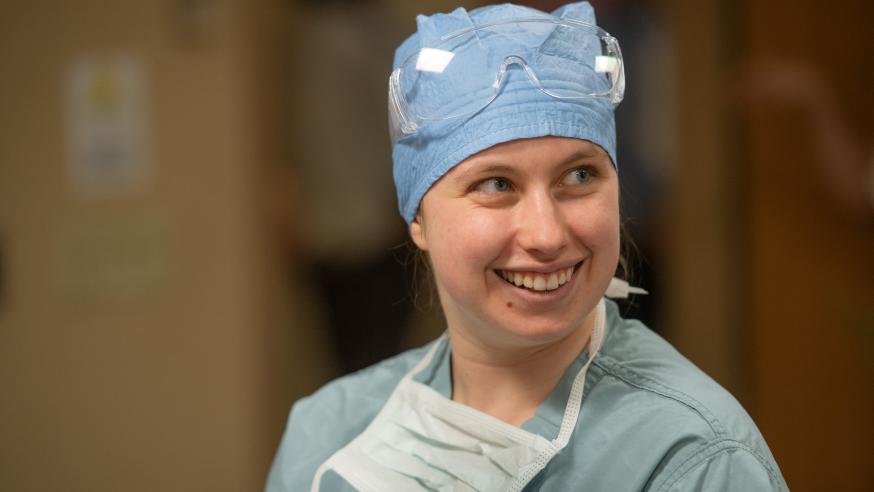
"For all three years of my time in the Biomedical Innovator Scholars program, I have been involved in separate projects in Dr. Matthews' lab. They have all been studies of alcohol use and addiction, identifying various behavioral changes due to consumption. We've done a longitudinal study on lifelong alcohol consumption, studies on binge drinking and we're currently studying the effects of low-dose alcohol," Rossmann says.
"As the laboratory manager, I oversee all animal projects in the lab, including animal care and maintenance, behavioral tests performance, data collection and review, and ultimately the writing and editing of publications. We use rat subjects in all studies examining behavior.
Thus far, we have found adolescent alcohol exposure produced subtle cognitive deficits that lasted throughout the lifespan and aged rodents are significantly more sensitive to the effects of alcohol compared to younger animals. Recently we are narrowing in on the connection between alcohol use and falling in older individuals, through behavioral data and analysis of proteins in the brain.
I presented my research at the national research conference for the Research Society on Alcohol this past summer. It was an amazing experience, learning more about the field of alcohol use and abuse research, and meeting and interacting with world leaders in alcohol research. Coming in, I wasn't quite sure what to expect of the program, but I was excited to do research and work with Mayo Clinic physicians.
Participating in the 'Behind the Red Line' trauma simulation during the National Conference for Undergraduate Research (NCUR) let me take on the role of a physician, and gave a glimpse into the life of trauma and ER medical professionals. A career in medical research would be long days of collecting and analyzing data, but this experience showed me that, in the end, it truly is rewarding when you realize the significance and impact that your research can make in patient care."
A word from Rossman’s mentor, Dr. Douglas Matthews, professor of psychology:
“Gillian joined the laboratory in an intense, 'thrown into the deep end of the pool' type situation. Over the years I’ve seen her develop from a first-semester student trying to figure out how to do college to a growing independent researcher who presents data to directors of Alcohol Research Centers at major R1 universities around the world. In her time as an undergraduate in the innovator program Gillian has moved from being a student to being a colleague whose thoughts, opinions, experience, and productivity are respected," Matthews says.
“Specific to this study, Gillian has been instrumental in data collection, data supervision and dissemination of the results in terms of presenting data at national research conferences and in peer review publications. Gillian has been a co-author on three peer-reviewed papers to date and will be a co-author on an additional two papers to be submitted within the coming months.”
To learn more about the Blugold Biomedical Innovator Scholars program, see the program webpage. You can also see brief introductions to all 30 scholars in the program on the Current Scholars page.
You may also like
